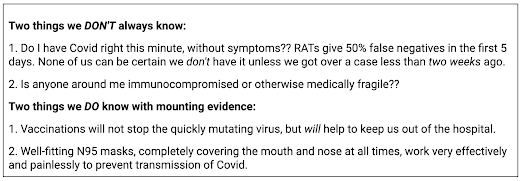The Toronto Star just quoted Kieran Moore,
I’m very loath, after 1,000 days of a pandemic, to put in a mandate. We know what works, and we can trust Ontarians to do the right things.
Nope. If we could trust people to KNOW what's right with all the misinformation out there, and then to DO the right thing (i.e. wear an N95 completely covering mouth and nose at all times in all public places), then we wouldn't have kids being shipped to hospitals across the province because of overflow. It's even worse now that we have 112 Paediatric ICU beds in Ontario, and 122 patients in need of a bed.
In Ontario, 19 children have died of Covid so far. How much worse does it have to be for people to understand the need to wear an N95 around others? Like many communicable diseases, Covid spreads through carriers - a third of cases have no symptoms, so we need to mask even when we feel perfectly healthy. We can't know we have it, and can't know if someone nearby will die or be permanently disabled from catching it from us. Vaccines help prevent severity, but don't significantly stop transmission. N95s are a painless and effective way to stop the spread. If public health had pushed masks over hand washing in the last few years, then I might trust Ontarians to "do the right thing," but PH comms has been a disaster.
From a Socratic perspective -- he argued that if we know right, we'll do right -- the problem is that most people don't know in their hearts that walking around publicly without a mask is wrong. We often avoid doing wrong because we'll get in trouble, but when we really know wrong -- like if you were asked to kill an innocent child -- it doesn't matter whether or not you'd get in trouble because you wouldn't be able to betray your conscience to that extent. The problem with masks is that many people don't know it intellectually either. They don't get how Covid is transmitted and don't know what to believe about the effectiveness of masks, and they don't get the difference between an N95 that seals to the face and a flimsy bit of cloth or surgical mask. And then, once they get the right information, they have to make the connection between walking around the grocery store without a mask on and killing an innocent child, the one in the cart next to yours in the check-out line, or the one that the cashier has waiting at home for mum, in order to really know know that it's wrong. Only then can we trust them to do the right thing.
Please wear an N95 or better in public places, especially schools, healthcare facilities, transportation, grocery stores, and anywhere people NEED to be. If you think we need a mandate in order to save the lives of our children, let Ford know at 416-325-1941.

